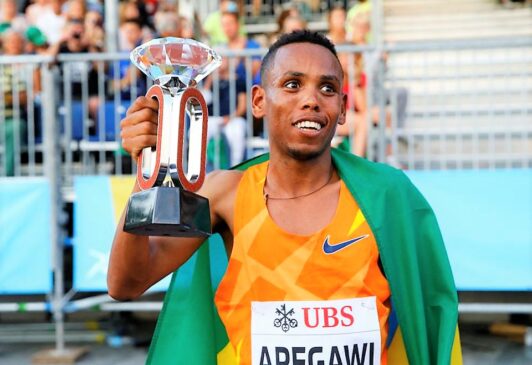World leads from Aregawi, Rupp and Dibaba in Stockholm

The 24th edition of the XL Galan, an IAAF Indoor Permit meeting, at the Stockholm Globe Arena on Thursday (21) was filled with brilliant performances and was just 12 hundredths from a perfect conclusion.
That was the meagre margin by which Abeba Aregawi in her first race this winter – as well as her first race representing Sweden – missed the 1500m World indoor record.
As has been the tradition at this meet throughout the years, it was the middle and long distances that provided most of really spectacular performances, and they produced five of the six world-leading marks.
Although there were five other world-leading marks, the lasting image of the 2013 XL Galan will be of Abeba Aregawi floating effortlessly around the track at World record pace for seven-and-a-half laps.
Had there not been a clock, it would have been impossible to grasp how fast Aregawi really moved. Her splits were: 30.2, 62.0, 1:35.0, 2:07.7 (when the pacemaker left), 2:40.2, 3:12.8 and 3:43.8, before crossing the line in 3:58.40. Her last 200m was covered in 29.5!
She smashed the Swedish records both indoors (4:07.74) and out (4:05.49) and improved on her own meeting record of 4:01.47 set two years ago.
Ethiopia’s Mohammed Aman set the tone at the beginning of the evening with an inspired 800m race where he was the only one who dared to follow the pacemaker. Once he was alone, he pushed relentlessly to the finish line to win in 1:45.05, improving the world-leading time by more than a second and his own national record by 0.35. Just seven tenths outside the World indoor junior record, it was the third-fastest performance ever indoors by a junior athlete.
One-and-a-half seconds behind the winner, Poland’s Adam Kszczot strengthened his position as the favourite for the European indoor title next weekend by leaving the chasing group a second behind on the last lap.
Dibaba and Rupp impress in 3000m
The women’s 3000m also turned into an impressive exhibition by one runner from Ethiopia. After two impressive wins at 1500m previously this winter, Genzebe Dibaba turned her attention to the 3000m and it soon became clear she was a woman on a mission – with her mission being to challenge Meseret Defar’s World indoor record!
The pacemakers helped her for 1300m, but from then on it was Dibaba vs the clock. At 1000m (2:48.8) she was even with Defar’s pace, and at 2000m (5:37.2) she was 1.8 seconds ahead, but in the end she couldn’t speed up like Defar had done and Dibaba ended up running 8:26.95, missing the record by three seconds. But there was at least some consolation in smashing Defar’s meeting record of 8:36.91 from two years ago.

The men’s 3000m also saw a meeting record broken that had previously belonged to another Ethiopian legend, Kenenisa Bekele. The target for the pacemakers was to pile on 30-second laps for as long as possible and they did a very good job at that, passing halfway at 3:46.
When the race for the win began in earnest at 2000m, the clock showed 5:02 for the top duo of Kenya’s Caleb Ndiku and US Olympic silver medallist Galen Rupp. In the last few laps it was Rupp leading way, gradually increasing the pace and inching away – 29.5, 29.0 and 28.3.
He had said before that his main ambition was to win and to work on his finishing speed and he certainly achieved those objectives. He won by one-and-a-half seconds and his winning time of 7.30.16 broke the US indoor record (7:32.43) by more than two seconds.
The only middle-distance event that ended up slightly disappointing was the one that had been most anticipated in advance – the men’s 1000m. Only Ayanleh Souleiman of Djibouti followed the pacemakers, even though the pace was nothing exceptional (53 at 400m, 1:21 at 600m, 1:49 at 800m).
The winning time 2:17.05 was of course a world-leading mark but the World record challenge never materialised. Just like in the 800m it was a runner from Poland – here Marcin Lewandowski – that in the closing stages left the pack to take second. And had he started his kick a little earlier, he could have caught the tiring Souleiman.
Read more on IAAF.org



